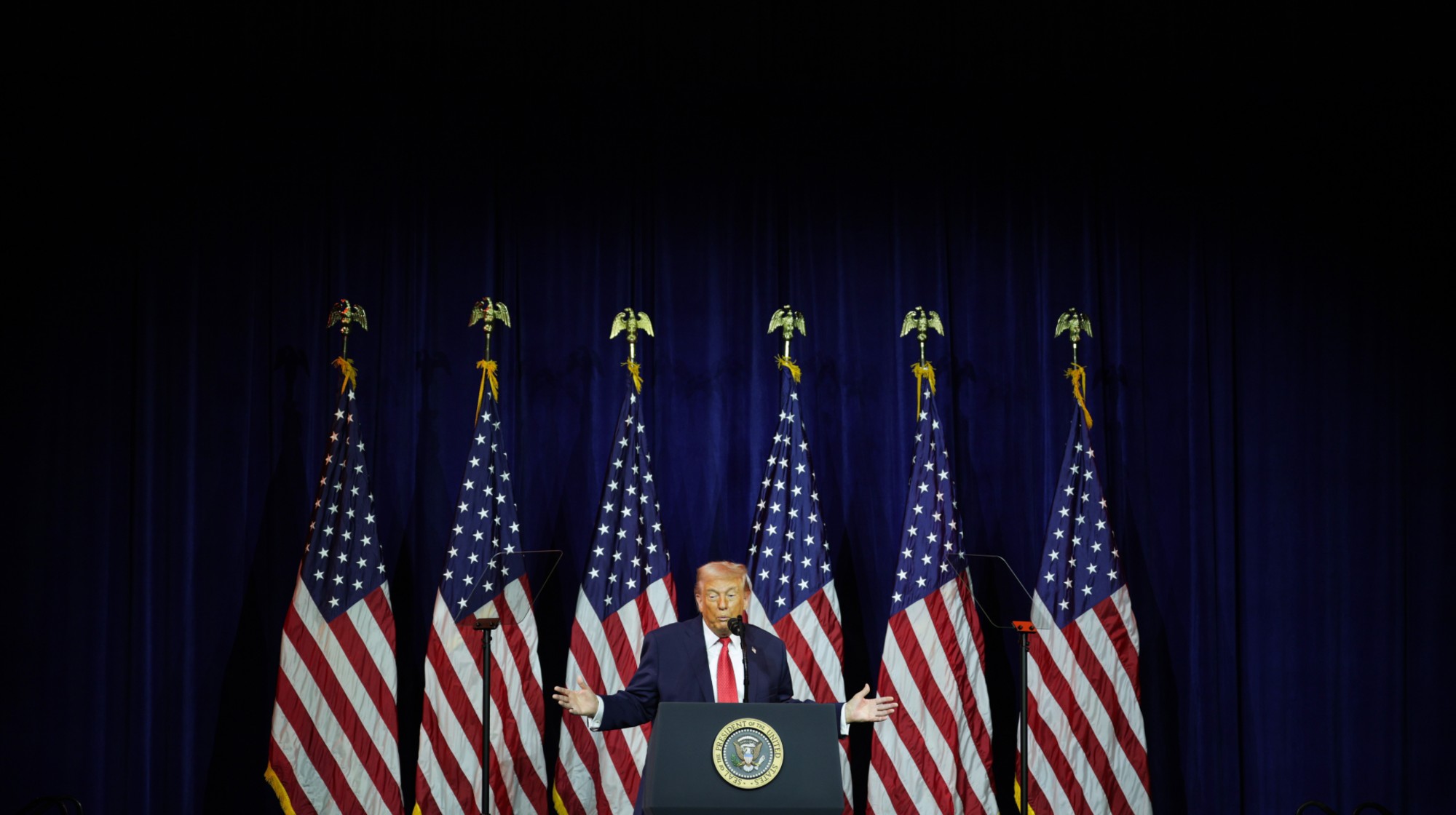Impeachment is failing. Time for Plan B.
Why the House should pass a resolution formally censuring the president


A free daily email with the biggest news stories of the day – and the best features from TheWeek.com
You are now subscribed
Your newsletter sign-up was successful
The old cliché is true: Politics is the art of the possible. That's why the Democrats need to abandon their quest to remove President Trump from office by way of impeachment — because doing so is going to be impossible.
It was always going to be the longest of long shots. In all of American history, a president has never been removed through impeachment — let alone when the president's own party has held the majority in the Senate, where the impeachment trial takes place and conviction and removal requires an incredibly steep two-thirds majority vote. Add in the extreme polarization of the present moment and you have the political equivalent of trying to reach the summit of Mt. Everest in a blizzard while wearing running shoes and a wind breaker.
Many of us were tempted to downplay how daunting the obstacles would be because Trump really is that bad. His attempt to extort the president of Ukraine into digging up dirt on his political rival was a gross abuse of power that warped American foreign policy, making it serve Trump's personal political aims, and showed that he (remains) eager to enlist the help of foreign powers to help him cheat in an election. How could patriotic Americans and civic-minded public servants not favor impeaching such a president?
The Week
Escape your echo chamber. Get the facts behind the news, plus analysis from multiple perspectives.

Sign up for The Week's Free Newsletters
From our morning news briefing to a weekly Good News Newsletter, get the best of The Week delivered directly to your inbox.
From our morning news briefing to a weekly Good News Newsletter, get the best of The Week delivered directly to your inbox.
That's certainly why I came out strongly in favor of the effort. Yes, it would be extremely difficult, but, I believed, what counts as possible in politics isn't static. If the evidence was overwhelming and powerfully presented in public hearings, then maybe some Republicans — maybe enough Republicans — could be persuaded to do what was right for the country, regardless of its consequences for their party. It was unlikely. But the alternative to making the effort was the normalization of presidential corruption on a scale never before seen in American political history.
The problem is that the evidence has been overwhelming and powerfully presented in public hearings — and yet very few Republicans have been persuaded to change their minds, either in public opinion polls or in the House and Senate. And that runs the significant risk of producing even worse normalization of presidential corruption. Trump will be able to say, "They threw everything they had at me, and I won. It was all a hoax. I did nothing wrong."
That's why the time has come for Plan B.
Instead of trying and failing to remove Trump through impeachment, the House should pass a resolution formally censuring the president. In doing so, it would be following the example laid down by the Senate, which censured President Andrew Jackson in 1834.
A free daily email with the biggest news stories of the day – and the best features from TheWeek.com
This is a suggestion that was first made by William Galston in The Wall Street Journal back in September. I was skeptical of the proposal at first, since I thought the Democrats needed to try for more. But Galston was right to foresee that the impeachment drive would both fail and threaten to provide Trump with the appearance of vindication. That's what led Galston to conclude that "if inaction is dishonorable and impeachment futile, censure is the only course that makes both moral and political sense."
The House should use the impeachment inquiry to develop the factual basis for a comprehensive bill of particulars against President Trump — an enumeration of his most egregious affronts to the spirit of the laws and the Constitution, and to the honor and dignity of the office he holds. They should pass this bill as a formal motion of censure. And then the Democrats should take their case to the ultimate judges in our republic, the people themselves, for a final decision in November 2020. The Senate will not remove the president from office; only the people can. [William Galston, The Wall Street Journal]
Perhaps the biggest advantage of proceeding in this way is that it would free up the Democrats to go "comprehensive," as Galston puts it, and include in the censure many examples of Trump's thoroughgoing corruption beyond the attempted extortion of Ukraine. I understand full well why House Speaker Nancy Pelosi and House Intelligence Committee Chairman Adam Schiff have chosen a narrow focus for the impeachment inquiry: There is just so much sleaze that widening the scope would threaten an endless, diffuse investigation that never builds to any clearly defined outcome.
But a formal censure wouldn't take the form of an inquiry aimed at persuading skeptical members of the Senate to join in an effort to remove the president from office. It would merely be an attempt by the House majority to enter evidence of corruption into the public record and pronounce it a full-frontal assault against liberal democratic and constitutional norms. Republicans could rail against this evidence and judgment all they wanted, but it would still be there for Americans of the present and future to evaluate for themselves.
Of course this way of proceeding would be guaranteed to leave the president in office. But then, so would a failed impeachment effort. At least a formal censure would deny Trump the appearance of exoneration.
But accepting this outcome would require Democrats to give up their hopes of making Trump disappear without having to defeat him in an election. That will be hard, because Democrats know that defeating Trump is going to be hard.
They should console themselves in the knowledge that, however challenging it will be to get rid of Trump next November, it can't be as difficult as accomplishing the impossible.
Want more essential commentary and analysis like this delivered straight to your inbox? Sign up for The Week's "Today's best articles" newsletter here.
Damon Linker is a senior correspondent at TheWeek.com. He is also a former contributing editor at The New Republic and the author of The Theocons and The Religious Test.
-
 How to Get to Heaven from Belfast: a ‘highly entertaining ride’
How to Get to Heaven from Belfast: a ‘highly entertaining ride’The Week Recommends Mystery-comedy from the creator of Derry Girls should be ‘your new binge-watch’
-
 The 8 best TV shows of the 1960s
The 8 best TV shows of the 1960sThe standout shows of this decade take viewers from outer space to the Wild West
-
 Microdramas are booming
Microdramas are boomingUnder the radar Scroll to watch a whole movie
-
 Democrats pledge Noem impeachment if not fired
Democrats pledge Noem impeachment if not firedSpeed Read Trump is publicly defending the Homeland Security secretary
-
 The billionaires’ wealth tax: a catastrophe for California?
The billionaires’ wealth tax: a catastrophe for California?Talking Point Peter Thiel and Larry Page preparing to change state residency
-
 Trump fears impeachment if GOP loses midterms
Trump fears impeachment if GOP loses midtermsSpeed Read ‘You got to win the midterms,’ the president said
-
 Bari Weiss’ ‘60 Minutes’ scandal is about more than one report
Bari Weiss’ ‘60 Minutes’ scandal is about more than one reportIN THE SPOTLIGHT By blocking an approved segment on a controversial prison holding US deportees in El Salvador, the editor-in-chief of CBS News has become the main story
-
 Democrat files to impeach RFK Jr.
Democrat files to impeach RFK Jr.Speed Read Rep. Haley Stevens filed articles of impeachment against Health and Human Services Secretary Robert F. Kennedy Jr.
-
 Has Zohran Mamdani shown the Democrats how to win again?
Has Zohran Mamdani shown the Democrats how to win again?Today’s Big Question New York City mayoral election touted as victory for left-wing populists but moderate centrist wins elsewhere present more complex path for Democratic Party
-
 Millions turn out for anti-Trump ‘No Kings’ rallies
Millions turn out for anti-Trump ‘No Kings’ ralliesSpeed Read An estimated 7 million people participated, 2 million more than at the first ‘No Kings’ protest in June
-
 Ghislaine Maxwell: angling for a Trump pardon
Ghislaine Maxwell: angling for a Trump pardonTalking Point Convicted sex trafficker's testimony could shed new light on president's links to Jeffrey Epstein
